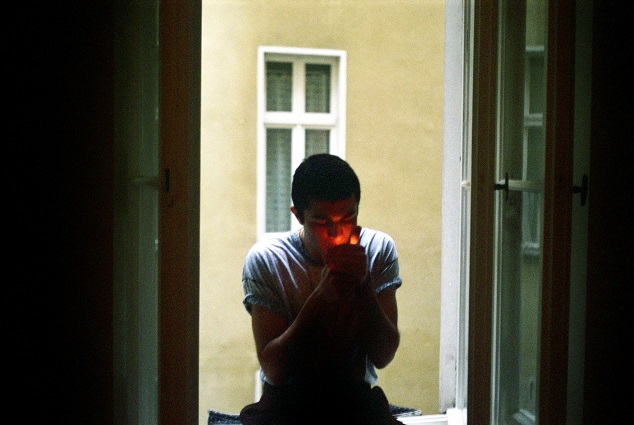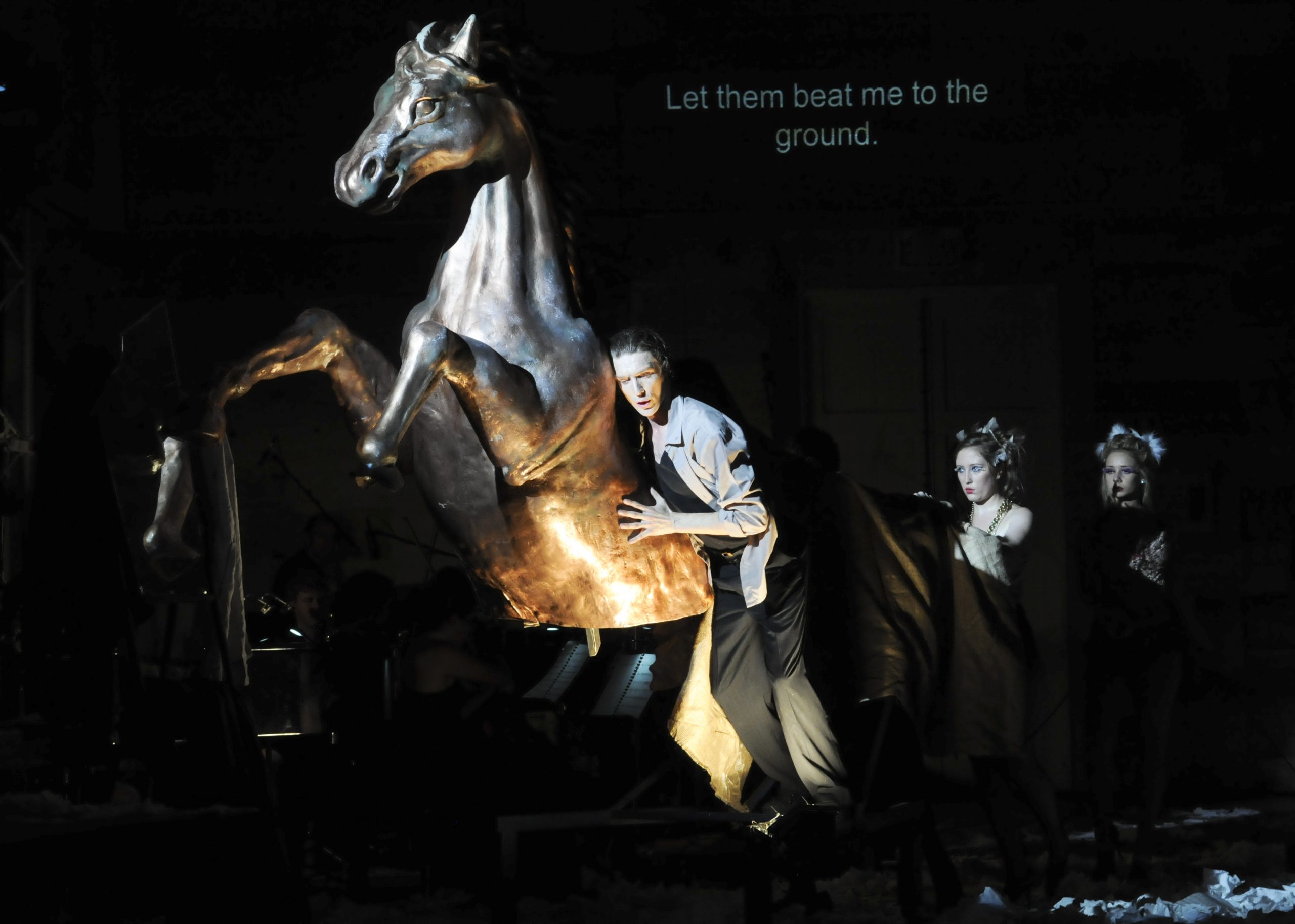A STRANGE
KIND OF POETRY
Pierce Wilcox on the art of libretto writing
By Annarosa Berman
A friend recently asked librettist Pierce Wilcox how it felt to have written two librettos in two years. Wilcox’s answer was, “Well, it feels different to everyone else I know!”
In Australia today, opportunities to write librettos are scarce. Yet by mid next year Wilcox will have had three libretti performed in close succession: Fly Away Peter, based on the novel by David Malouf, Victory Over the Sun, a reworking of Michail Matyushin’s futurist opera, to be performed for the opening of the Sydney Biennale next March, and Notes from Underground, based on the Dostoyevsky novella, which has its second run later in 2016 in a completely new production and revision.
As a teenager Wilcox dreamed of being a director or playwright. It came as a surprise when in his final year of uni, Sydney Chamber Opera co-founder Louis Garrick asked him if he would like to write a libretto based on Dostoyevsky’s novella, Notes from Underground. “Louis said, ‘Look, do you want to write a libretto for this guy, Jack Symonds? He’s just graduating from uni and he’s a composer and he’s brilliant.” Wilcox laughs when he recalls his reaction. “I said, ‘Oooo….kay. But 90% of me felt, oh shit, I don’t know enough about this!”
Help arrived in the form of homework from Symonds, who suggested that Wilcox read David Harsent’s libretto for The Minotaur, Meredith Oakes’ The Tempest, David Malouf’s Voss and Myfanwy Piper’s Death in Venice.
In those early days, what now seems obvious was baffling and ludicrous. “Jack would say, ‘This is a wonderful word to read, but you can’t sing it.’ It also took a while to grasp that the librettist leaves vast amounts of space for the music, which tells most of the story and communicates the emotion. “I was reading the librettos thinking, ‘Who is this guy? Where does that woman fit in? Why does he love her? This page is just bird noises!’
Wilcox also learned that in libretto writing, clarity was essential. “If the soprano is going to sing three words that encapsulate everything that’s going on dramatically, poetically and symbolically, choosing the right word and making sure that it’s as short and sharp and clear as possible, is crucial.”
But if the words have to be short, they also have to be dense and infused with meaning. “In opera, words are often repeated, they take a long time to sing, and they are shown in the surtitles. So you can throw a strange kind of poetry at the audience, knowing that they will have time to pick it apart.” Intricate words also provide a variety of hooks for the composer.

To some, the choice of Notes from Underground as basis for an opera seemed like a crazy idea. It consists of two parts, the first being a philosophical rant by a man who, in an impotent fury that everything has gone wrong in the St Petersburg of his day, has locked himself away from society. The second part is his recollection of the incident that caused the rant. Symonds wanted the two storylines to unfold simultaneously, so that the diatribe inspired by the event, and the event itself, would happen on stage at the same time. Wilcox says: “The conceit broke the novel open in a powerful way. The older character could look at his younger self and mock and jeer.”
Wilcox’s job was finding resonances between the two parts of the novel, and weaving them together. “Jack and I proceeded in fits and starts; it was a constant conversation rather than me going away and writing the whole thing. We collaborated on everything.”
Wilcox’s second libretto, for Fly Away Peter, presented a different set of challenges. To begin with, writing a libretto based on a novel by one of Australia’s most iconic living authors, was “hugely intimidating”. Wilcox laughs. “As a person David Malouf is warm and generous, but intellectually, he’s very threatening!”
Luckily Malouf understood the young creative team’s dilemma; when writing the libretto for Richard Meale’s Voss, based on Patrick White’s novel, he too, had to come up with his own approach to a landmark novel by a giant of Australian literature. “David made it clear that his novel was a thing apart from our opera; that we should have confidence and faith in our own work.”
There were other challenges. Like that in Malouf’s novels the action is internal and the characters are transformed in the spiritual realm. Says Wilcox: “Creating an opera with almost no scenes presented an interesting dilemma. What we tried to capture instead was David’s poetic voice.”

“In opera, words are often repeated, they take a long time to sing, and they are shown in the surtitles. So you can throw a strange kind of poetry at the audience, knowing that they will have time to pick it apart.”
It helped that Wilcox and Fly Away Peter composer Elliott Gyger had an instant rapport. Wilcox laughs when he remembers their interaction: “Jack and I were young people starting out, so there was this youthful energy about our collaboration. Elliot is a bold writer and a man of vision, but he’s certainly much more restrained than the two of us were!”
With Victory Over the Sun, which SCO is “recreating” with major Sydney visual artist Justene Williams and composer/SCO Artistic Associate Huw Belling for the opening of next year’s Sydney Biennale, it’s back to crazy exuberance. The libretto, Wilcox’s third, is partially written in so-called “Zaum” language, and when asked for his take on how this works in opera, he bursts out laughing. “I don’t think anyone knows how this works! People have been claiming to know how it works for over a century now; but no two scholars have been able to reach agreement on the issue!”
Zaum, “a language created by madmen”, is a linguistic sound experiment that aims to take language beyond rational meaning. It is full of onomatopoeia and dense with cultural references that are entirely lost on modern audiences. “We have no idea what it was like for the audience when it was first performed. We think they probably felt assaulted. Which is what the creators were aiming for.”
Translating this “text” for a contemporary Sydney audience, while retaining the deliberate nonsense of the original, is the challenge. “You want something that is a little bit beyond the audience’s conception. Like backwards talking in a horror film. You want people to think, that sounds like English, but I can’t understand it.”
It might help to bear in mind that Victory Over the Sun is about the future going to war with the past. “At least, that’s what we think it’s about!”
With the enthusiasm that is typical of SCO, Wilcox says that the creative team is blown away by the possibilities of the work. “But it’s a strange project even by our standards.”
Never having dreamed of being a librettist, now that he is, Wilcox finds the experience immensely rewarding. “Libretto writing provides an opportunity to use the skills of word craft and literature and the shaping of meaning through text. But it also brings you into contact with art forms and creatives that you would never have met through writing essays or plays or novels.”
Keep in touch
General Inquiries
- contact@sydneychamberopera.com
-
SCO, Carriageworks
PO Box 3035 Redfern, NSW 2016
Postal Address -
SCO, Carriageworks
245 Wilson St Eveleigh, NSW 2015
Resident Address - (02) 8571 9106